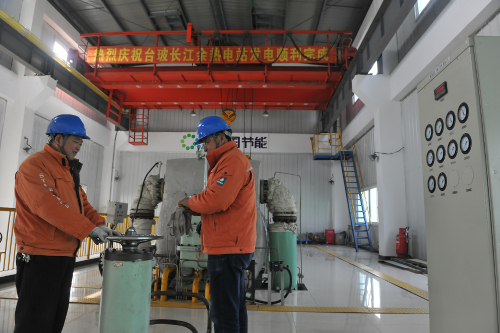|
 |
|
ENERGY CONSERVATION: Workers carry out equipment safety inspection in a distributed waste heat power station in Kunshan, east China's Jiangsu Province on January 21 (LING TAO) |
Lower Threshold
A new foreign investment law will ease restrictions on foreign investors and grant them easier access to the Chinese market, the Ministry of Commerce said on January 19.
Overseas companies will receive pre-establishment national treatment and the current troublesome case-by-case approval system be replaced by negative list management, if the new law is passed.
Only foreign investment on the negative list will have to apply for permission, but all investors must report to the government no matter whether they are on the list or not.
The negative list for foreign investment was introduced in the China (Shanghai) Pilot Free Trade Zone in September 2013. Since then, authorities elsewhere have been eager to replicate the system.
According to the new law, enterprises will not be regulated based on their ownership but on who is in control. Foreign enterprises on the Chinese mainland that are controlled by overseas investors will be considered foreign, while those controlled by Chinese investors will be regarded as domestic.
QFII Quota Offered
China has agreed to give Switzerland an $8-billion investment quota under its qualified foreign institutional investor (QFII) program.
The agreement is part of a memorandum of understanding signed by the central banks of the two countries on January 21, which also includes a plan--pending regulators' approval--to set up the first branch of a Chinese bank in the Swiss financial hub of Zurich for future yuan clearance.
The deal is set to materialize Beijing and Bern's pledge for closer financial ties and accelerate the establishment of a Zurich offshore yuan market, which will mark a crucial step in the internationalization of the yuan, especially in Europe.
The signing came after visiting Chinese Premier Li Keqiang, who met in the ski resort of Davos with President Simonetta Sommaruga of the Swiss Confederation on the sidelines of the 2015 annual meeting of the World Economic Forum.
Existing Fund Activated
The State Council on January 21 announced fiscal policy plans to stabilize economic growth.
The Chinese cabinet said in a notice that Central Government departments and local governments should reallocate any unspent money from the 2012 fiscal year and before that to the new budgets.
The aim is to "activate existing funds" and ensure a more proactive fiscal policy is implemented.
China's economy last year posted its weakest annual expansion in 24 years, which may lead to slower growth in national fiscal revenue and higher expenditure.
A pilot scheme, starting this year, will establish a three-year rolling budget in sectors such as compulsory education, healthcare and environmental protection to achieve targets.
It also vowed to intensify crackdowns on violations such as embezzlement of state revenue.
| 